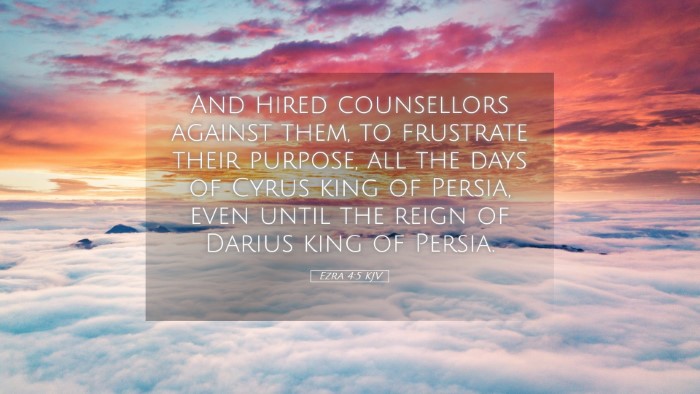Old Testament
Genesis Exodus Leviticus Numbers Deuteronomy Joshua Judges Ruth 1 Samuel 2 Samuel 1 Kings 2 Kings 1 Chronicles 2 Chronicles Ezra Nehemiah Esther Job Psalms Proverbs Ecclesiastes Song of Solomon Isaiah Jeremiah Lamentations Ezekiel Daniel Hosea Joel Amos Obadiah Jonah Micah Nahum Habakkuk Zephaniah Haggai Zechariah MalachiEzra 4:5
Ezra 4:5 KJV
And hired counsellors against them, to frustrate their purpose, all the days of Cyrus king of Persia, even until the reign of Darius king of Persia.
Ezra 4:5 Bible Commentary
Commentary on Ezra 4:5
Introduction
Ezra 4:5 introduces a pivotal moment in the rebuilding of Jerusalem, particularly focusing on the opposition faced by the returning exiles. This commentary aims to explore the significance of this verse through insights drawn from notable public domain commentaries, including those of Matthew Henry, Albert Barnes, and Adam Clarke.
Verse in Religious Context
Text of Ezra 4:5: “And hired counselors against them, to frustrate their purpose, all the days of Cyrus king of Persia, even until the reign of Darius king of Persia.”
This verse emerges during a time of great transition and rebuilding for the Jewish people, who had returned from Babylonian captivity. The context of opposition is significant as it illustrates the challenges faced by those desiring to restore their religious and civic identity.
Understanding Opposition
Matthew Henry's Insight: Henry emphasizes the role of the adversaries in this narrative. He explains that the “hired counselors” represent the persistent efforts of opposition against the divine plans. The phrase implies that the forces of opposition are not only external but also organized and deliberate in their attempts to thwart God’s intention for His people.
Albert Barnes' Explanation: Barnes expands upon this idea by noting that this opposition continued throughout the reigns of multiple kings, indicating a sustained effort that aimed to undermine the rebuilding of the temple and the city. This suggests a deep-seated enemy, one that was not merely reacting to the events but proactively seeking to derail the Jewish restoration.
Adam Clarke's Perspective: Clarke points out the strategic involvement of counselors who were likely skilled in political maneuvering. He underscores that such opposition serves as a reminder of the ongoing spiritual warfare that believers face throughout history; this was not merely a physical rebuilding effort but also a spiritual revival.
The Role of Counselors
The mention of “counselors” is critical as it reflects both the human element in the spiritual struggle and the reliance upon earthly wisdom against divine purpose.
- Human vs. Divine Wisdom: Henry identifies the contrast between human counsel versus divine wisdom. The opposition hiring counselors mirrors the temptation to rely on worldly means instead of trusting in God's providential guidance.
- Political Intrigue and Manipulation: Barnes explains that such counselors often played intricate roles in manipulating events to maintain the status quo, which was often against the interests of the exiled Jews. This reveals the intertwined nature of politics and spirituality during this era.
- Spiritual Interpretation: Clarke emphasizes that the practice of hiring counselors not only highlights the physical opposition but reflects a deeper spiritual resistance against God's intended plans for restoration.
Historical Context
The historical backdrop of Ezra 4:5 is set against the larger narrative of the restoration following the Babylonian exile. The opposition faced by the returning exiles underlines the spiritual and national struggles inherent in reclaiming their identity.
- Continuity of Opposition: Henry notes the continual nature of this opposition, which persisted throughout the reigns of Cyrus and Darius. This indicates a broader understanding of how spiritual adversaries may operate through various cultural and political means across time.
- God’s Sovereignty: Barnes remarks on the overarching sovereignty of God even amidst this opposition. The faithfulness of God in fulfilling His promises does not negate the reality of resistance, but rather highlights the need for steadfastness among believers.
- Lessons from History: Clarke draws contemporary insights, indicating that just as the early Jewish community faced adversaries, modern believers must also remain vigilant against similar spiritual challenges. He highlights the importance of unity and perseverance in the face of opposition.
Theological Implications
The Nature of Spiritual Conflict: This passage points to an ongoing theological theme—spiritual warfare. The use of “counselors” indicates a level of strategic planning by forces opposed to God’s work. This serves as a reminder that opposition may take various forms, and believers must remain alert to its nuances.
God’s Faithfulness Amidst Trials: Importantly, while the exiles faced adversity, the narrative unfolds within the assurance of God’s promises. Barnes highlights that while opposition does exist, it serves to refine faith and deepen reliance on divine guidance.
Hope and Perseverance: The verse encapsulates a theme of hope. Despite the efforts to frustrate their purpose, the determination of the Jewish people to rebuild reflects the promise of restoration that God offers throughout the scripture. Clarke encourages believers to find strength in knowing that God’s plans, even when faced with opposition, will ultimately prevail.
Conclusion
In conclusion, Ezra 4:5 serves as a profound reminder of the challenges faced by the people of God throughout history, and the ongoing relevance of these struggles for contemporary believers. Insights from public domain commentaries illuminate the multifaceted nature of this opposition and the theological truths that emerge from it.
This verse calls on pastors, students, theologians, and Bible scholars to reflect on the importance of faith in the face of opposition, the reliance on divine wisdom over human counsel, and the assurance that God’s sovereign purposes will ultimately be fulfilled. As the narrative in Ezra continues, it challenges believers to persist in their faith and commitment to God’s work, trusting that He is capable of overcoming any barriers that stand in the way of His will.


